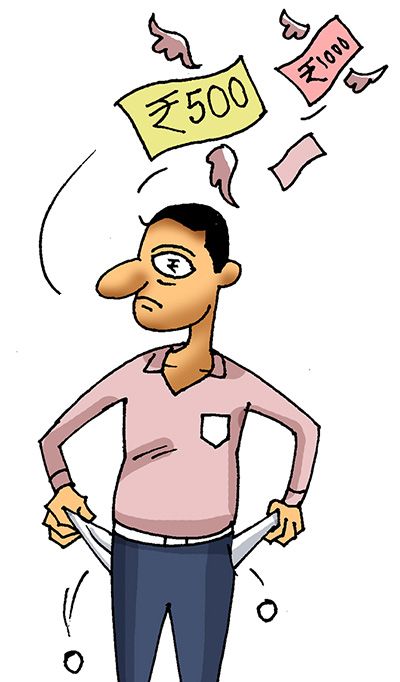'Even if the government didn't plan for demonetisation properly, it could have taken steps on a war footing later to ensure the situation improves.'
Tinesh Bhasin reports.
Illustration: Dominic Xavier/Rediff.com
 The initial euphoria of the middle class over demonetisation in which the narrative was 'let's go through some pain for future gains,' seems to be fast fading.
The initial euphoria of the middle class over demonetisation in which the narrative was 'let's go through some pain for future gains,' seems to be fast fading.
A recent survey of 8,526 people by LocalCircles, a citizen engagement platform, has found that the number of people supporting the move and its implementation is down to 39% from 51%, three weeks ago.
A family mall (a small mall that only stocks basic daily goods) in Kannur, Kerala, did almost zero business for the first 10 days of demonetisation.
The mall owner's crime: He did not have a card-swiping machine.
"Customers are unwilling to part with even Rs 20 to Rs 30 in change because they don't know when there will be cash in the banks and ATMs," he says. He had called his local bank several times, but they had no time to come and install a point-of-sale machine in his shop.
Over a month later, things haven't changed much.
Most banks branches are still unable to dispense the entire Rs 24,000 a week limit.
Many ATMs aren't dispensing cash either. The few ones, which are working, are giving out only Rs 2,000 notes.
"Even if the government didn't plan for demonetisation properly, it could have taken steps on a war footing later to ensure the situation improves. It's been more than a month-and a-half and banks are still turning us away," says Delhi resident Premnath Kohli, 65, a retired government employee.
And, if standing in queues wasn't enough, the government kept citizens on their toes by changing rules frequently -- 60 times in 50 days.
The initial exchange limit was Rs 4,000 on November 8, and it was supposed to be reviewed after 15 days. But within a week, the government changed its mind and reduced it to Rs 2,000.
On November 25, exchange of notes over-the-counter was completely banned.
The Reserve Bank of India declared on December 19 that people depositing more than Rs 5,000 would be able to do it only once and would need to explain why they did not deposit earlier, and this despite assurances from Finance Minister Arun Jaitley that there was time till December 30 to deposit old notes.
This decision was reversed after citizens cried foul and industry sources say that even bankers were extremely uncomfortable with this line of questioning to their existing Know-Your-Customer-compliant clients.
People who were planning to get married had a harrowing time. The government allowed them to withdraw a generous amount of Rs 250,000.
But the conditions laid down by the apex bank like establishing that the persons who the payments were being made to did not have a bank account made things extremely difficult.
The pain was not limited to standing in queues and adjusting to changing rules. Several people died.
Horror stories did the rounds of a newborn's death because the doctor refused to accept old notes in Mumbai and several senior citizens dying of heart attacks while standing in lines.
Frustrated mobs attacked bank branches in many cities.
The worst hit is the informal sector where small-and-mid-sized businesses are unable to pay cash to their workers. This has led to reverse migration.
The ever-changing narrative from getting rid of black money and counterfeit notes to going cashless hasn't happened. But people have, indeed, started going digital in the absence of cash.
As a State Bank of India research report points out, going cashless has resulted in lower per-value transactions.
The average transaction at PoS terminals was Rs 1,714 for November and Rs 1,643 for December compared with Rs 2,229 in October.
However, the experience has not been too good for many as cost is a major factor.
"The government fails to realise that the transaction costs are much more when one opts for digital payments. We have to shell out 20% to 30% more for vegetables and fruits when bought at a supermarket," says Anita Verma, a housewife in Mumbai.
Also, the banking infrastructure is ill equipped to handle large volumes of card transactions.
Even Paytm, which has been advertising heavily to promote cashless transactions, has faced several problems. It has lost around Rs 10 lakh (Rs 1 million) to fraudulent refund claims. Several customers have lost money while transacting through the app.
Using less cash is still possible in metros. But in many parts of the country poor connectivity, low per capita income and a thin banking network is creating hindrances for people who want to go digital.
*61 actually. On Friday night, the government raised the withdrawals at ATMs.











